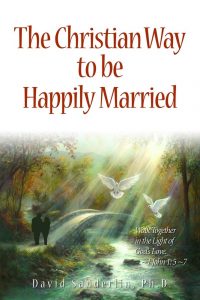The Christian Way to Be Happily Married
 “The time is right for more emphasis upon Christian virtues in our marriage guidance,” David Sanderlin writes in “The Christian Way to Be Happily Married.”
“The time is right for more emphasis upon Christian virtues in our marriage guidance,” David Sanderlin writes in “The Christian Way to Be Happily Married.”
The author is convinced that by pursuing an authentically virtuous life it is possible to become transformed as a person – transformed in ways that make all the difference in the world for a marriage.
“We do not need to retreat to a monastery, convent or mountain cabin for prayer, fasting and a traditional contemplative life in order to become increasingly virtuous, Christ-like persons,” says Sanderlin. He adds:
“We can become increasingly virtuous, Christ-like persons in our own home by acting with love, wisdom and other Christian virtues in our busy marriage and family life.”
Sanderlin describes his book as a guide. It starts with an examination of early romantic love and finally progresses to a discussion of “Christ-like transforming love.”
The book leads readers step-by-step through an examination of “the Christian way to be happily married by following Jesus in the biblical sense of becoming like Jesus in our moral character and conduct, with love, wisdom and other Christian virtues during our ordinary marriage and family activities.”
Given the book’s analytical approach, I couldn’t help wondering if it is based on classes this retired college professor taught. I could imagine all or part of the book being used as a text by older students. Sanderlin’s approach also could make his book useful in parish discussion groups interested in exploring the value of the Christian virtues for marriage.
Obviously, this book differs considerably from many current books on marriage that propose strategies for resolving conflicts at home, improving communication, recognizing that each spouse is unique or identifying ways for wives and husbands to spend more time together.
A goal for Sanderlin is to improve upon “today’s conventional problem-centered marriage guidance” through his book’s “Christian growth-centered marriage guidance.”
Still, at various points the book offers advice that I found quite practical for couples at different stages in the marriage journey — advice about handling money well or viewing problems as opportunities for growth, for example.
I found Sanderlin’s thoughts about anger compelling. He holds firmly that couples do not “have to settle for anger, fighting and other hurtful conflict” in their marriage relationship and marital communication. “Our marital communications can be a loving marital art instead of a fighting martial art,” he states.
Sanderlin would appear to disagree with those who urge that couples not be hard on themselves for getting angry with each other. At the same time, he thinks there are couples who should allow themselves to be angry at times in the sense that this permits them to be themselves. He says, “If we are angry we should acknowledge our anger honestly; then we can deal with it.”
But the author’s discomfort with any overacceptance of anger in marriage seems clear. He takes this topic up at a point when he is examining a sort of midpoint in the marriage journey.
If anger in marriage “can be ‘healthy’” in the sense of “‘defusing bad energy so that couples do not feel angry anymore,” it nonetheless is “the elimination of the anger and the resolution of the conflict that is healthy, not the anger and conflict itself,” Sanderlin insists.
He cites one old American proverb which holds that “anger usually punishes itself and profits nobody,” and another that describes anger as “a brief madness” able to “do damage that lasts forever.”
A spirituality undergirds “The Christian Way to Be Happily Married.” It is a spirituality based upon the belief that living close to God and receiving God’s gifts is possible for couples and can transform their actual married life.
The book “draws from the Bible and other Christian classics to recover and develop a theory of growth in Christian marriage discipleship that is both faithful to the Christian tradition and relevant for contemporary marriage and family life” Sanderlin explains.
It seems undeniable that transformed people will live differently and that if they are married, their transformation will change their life together as a couple.
To be clear, though, the Christian transformation Sanderlin ultimately considers a worthy goal for spouses involves much more that achieving better control of one’s emotions or improving personal self-management. It is a transformed Christian life as some of the great spiritual masters understood it that Sanderlin appears to have in mind.
He writes, “We have the human and Christian potential to love God above all things and to love our partner as Jesus loves us. To the extent that we do these things, Jesus and his Father will come to us and make their abode with us.”
About the reviewer
David Gibson is the former, now-retired editor of Origins, CNS Documentary Service.
Disclaimer: Book reviews do not imply and are not to be used as official endorsement by the USCCB of the work or those associated with the work. Book reviews are solely intended as a resource regarding publications that might be of interest to For Your Marriage visitors.




